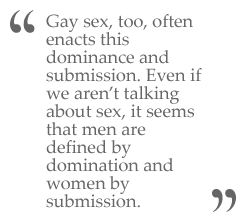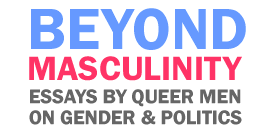|
MacKinnon and Dworkin have both noted that the way
society constructs, discusses, and engages in
heterosexual sex is in terms of violence and
domination. Dworkin argues that the way we talk
about and view heterosexual sex informs the way we
relate to each other and the way power structures
exist. In her book Intercourse, she writes
that we often discuss sexual penetration in terms of
violation to the point that “Violation is a synonym
for intercourse” (122). For Dworkin, the way men
talk in literature, philosophy, law, etc. draws on
the metaphor of heterosexual sex, but the way we
talk about sex (violation and penetration),
continues a system of domination of men over women.
It is not just that penetration occurs, but that
this penetration is talked about in terms of
violation: e.g., conquest, laid, dominated,
invaded, fucked — and that this violation is
normalized.
 MacKinnon too notes the violence that is used when
it comes to heterosexual sex. She believes that
heterosexuality is defined by “the eroticization of
dominance and submission” (178). Gay sex, too, often
enacts this dominance and submission. Even if we
aren’t talking about sex, it seems that men are
defined by domination and women by submission. The
countless times I was called “pussy,” “pansy,” and
“girl” in the hallways at school began to have a new
meaning to me after I read Dworkin’s and MacKinnon’s
work. If I wasn’t aggressive enough, I wasn’t fully
a man. I had to a be a “girl.” MacKinnon too notes the violence that is used when
it comes to heterosexual sex. She believes that
heterosexuality is defined by “the eroticization of
dominance and submission” (178). Gay sex, too, often
enacts this dominance and submission. Even if we
aren’t talking about sex, it seems that men are
defined by domination and women by submission. The
countless times I was called “pussy,” “pansy,” and
“girl” in the hallways at school began to have a new
meaning to me after I read Dworkin’s and MacKinnon’s
work. If I wasn’t aggressive enough, I wasn’t fully
a man. I had to a be a “girl.”
“Why must human experience by ‘gendered’ at all?”
Stoltenberg asks (304). This is a question that I’ve
spent quite a bit of time considering. It seems that
in a truly just society, we wouldn’t need gender. We
would be polyandrogynous beings, each one of us a
mixture of feminine and masculine traits without
being labeled as gendered. If society were this way,
it seems to me, then we wouldn’t have to rely on a
system of gendered domination. Youth wouldn’t feel
less than others because they didn’t live up to a
model of manhood. I wouldn’t have been humiliated by
the bullying of my brother on the bus. People
attracted to the same sex would be safer because
there would be no expectations that they be
attracted to certain people.
What this would ultimately mean, I believe, is
respecting one’s own and others’ dignity.
Stoltenberg writes that to be a man means to be
loyal to manhood rather than to oneself. To pass the
test of manhood one has to ignore the dignity of
others and of oneself, to reduce others to “Its”
instead of full humans, or “Yous” (1, 330). When we
men bully or demean others, we reduce them to
objects, to “Its.” This act of demeaning seems
completely wrapped up in the construction of
manhood. It seems that a genderless society would be
the best answer, and I admire some people who have
decided to use gender-neutral pronouns for their
efforts toward this change.
But here enters my ambivalence: I’ve considered my
discomfort at continuing to identify as a man, to
use the pronouns “he” and “him,” to continue
existing in a binary gender system with which I
disagree. I have considered instead identifying as
genderqueer and asking others to use the pronouns
“ze” and “hir” when referring to me. But I have to
consider pragmatism. I am visibly male, and unless I
take moves to alter my physical makeup, I will
probably always be coded by others as male, and thus
ascribed as a “man” by strangers. To deny that I
have been constructed as a man, I believe, would be
to also deny all the privileges that I get
(unearned) for being coded as a man in society. This
includes those privileges that we give men
unconsciously: taking their ideas more seriously,
listening with more respect, not interrupting their
words as often as we do women’s, to start a brief
list.
But there is another reason I don’t feel comfortable
starting to identify as genderqueer: as an educator,
I feel that if I am perceived as too radical (and
granted, some readers will already feel that I am),
I might lose identification with students. That is,
if I identify as genderqueer, I may alienate
students who have more traditional values. Losing
this identification with younger men is especially
dangerous, I feel, for male students who often need
a model of manhood that is as non-dominating as
possible. I now teach college, but when I taught
middle school, I think the model of manhood that I
presented (one that stuck up for women and queer
folk, one that showed interest in traditionally
feminine activities, one that wasn’t deep-voiced or
physically threatening) served as a model for the
quieter, weaker, and meeker (and possibly queer)
boys that one could be a man who was strong in
non-traditional ways.
So
what does it mean to me to be a queer man? We often
speak of allies in the queer community, generally in
terms of heterosexual folk who have chosen to work
and fight as allies to queer folk. But I’d like to
reposition this word, and stress the importance of
queer men as allies to other subjects of domination:
women, trans folk, other queer men, persons of
color, differently-abled folk, economically
disadvantaged people.
The ways we can go about this are various, but I
believe that three key approaches are important.
First, we must give up our unearned privilege when
we can. For example, male voices are given more
reverence than female voices in our society, and it
is important to let others speak and call attention
to situations when male voices are valued more
highly. Second, we must also use this unearned
privilege to help others when we can. This can
involve situations of speaking truth to power when
those in power won’t listen to the lived experiences
of oppressed people. Finally, if we are ever to
achieve a more equal, just society, we must break
the male bond, by which I mean when men bond over
the domination of others (e.g., talking about women
as if they are solely objects). It is vital to break
my bond with those men and instead stand up as an
ally for other oppressed folks.
Being a queer man is already an act of breaking the
male bond, but I don’t believe that coming out is
enough to fight the systems of domination that we
have been born into. It is a start, for sure. I’ve
developed close friendships over the last few years
with wonderful women, trans folk, and queer men
because I have chosen to fight sexism and other
systems of oppression. I’ve found that we can trust
each other to stand up for each other against acts
of domination. When I consider these trustful
relationships, I can’t imagine a life in which I had
chosen to attempt to be a ‘real man,” which I
believe would be a life of constantly reducing
others to “Its” and maiming their dignity — and
through that, destroying my own.
|




4 COMMENTS ON THIS ESSAY:
I just finished writing an essay about how wonderful this essay is. It's so modern and amazing. This is the best essay I have ever read. Is there more to read by Michael Faris? I would love to read more of his work.
Beautifully written, concise, and enjoyable to read. Thank you very much for this.
Really beautiful essay. An amazing message on how it would great if people could just accept others for who not what they are. Spot on about the way traditional masculinity is too often expressed by victimizing the 'other'.
I grew up in the south in the 50's and 60's so I know a lot about being picked on and bullied. I knew I was different from everyone else and couldn't understand why I was so disliked, everyone seemed to know but me, I liked more femminine things back then and when I finally opened that closet door when I was 17 it was like a whole new great world opened for me I could look people in the eye, hold my head up and was proud of myself I moved to New york and got in touch with myself and because of my life I had a much more intersesting life than all those small minded bigoted people I left behind I wish I had known someone like you , it would have made growing up a lot easier Just remember hold your head up and be proud of your unique self.